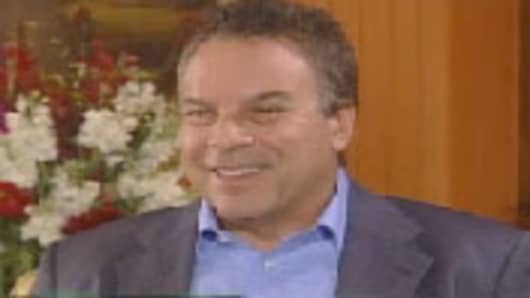Earlier I blogged about Jeff Greene, an investor who single-handedly shorted subprime through credit default swaps, turning himself into a billionaire. Check him out in this week's Forbes. He's made the list of the 400 richest Americans.
Greene shorted subprime before almost anyone else. Then, weeks before Bear Stearns collapsed, he started moving into cash because he didn't trust the markets. Call him lucky, or smart, or both.
So what is he doing now?
"I'm almost entirely in cash," he says. But he still has 20-30 percent of his money in subprime bonds which he believes will fail. He wants those bonds to fail, because he's bought insurance on them through a "credit default swap", and when they fail, he gets paid their full value.
But how long will it take them to fail? That's the potentially billion dollar question. How long do you keep paying premiums to insure something which may soon be worthless? Is it better to settle now for less than 100 cents on the dollar and save yourself all those premium payments?
"Sometimes I'll get an offer for 85 cents and I have to think, 'Well, when will it be 100?'" Greene says. "The problem in this whole space is that with the record number of foreclosures that are on the market, it's very difficult for anyone to figure out how long it's gonna take for the servicers to get through this huge amount of mortgages." From the insurer's perspective, he says, "When does it go to 100? If it goes to 100 in two years, then paying 90 (now) is expensive. If it goes to 100 in three months, then paying 90 is cheap."
And get this--Greene is now dipping his toe into investments in mortgage backed securities. The very things he shorted! Except, Greene says, he's only testing the waters with AAA rated securities, although some involve Alt-A mortgages. He's also invested a little money into Collateralized Loan Obligations (a bit like CDO's), bundles of loans to "the biggest companies in the world."
Though he long ago saw disaster coming to the financial markets, he's still surprised at the magnitude of the crisis. "I was telling people a year ago that I felt that every big bank and investment bank in America was technically bankrupt." Greene said he could see trouble in the monthly data he got from the subprime-backed bonds he had insured. If assets were truly marked to market back then, he said, not just the big firms like Lehman would look disastrous, "but almost every one of them would have technically had no stockholder equity."
Since I first reported on him, I've heard from more than one tenant at one of the apartment buildings he owns who doesn't care for him as a landlord. He remains busy renovating a 40,000 square foot Beverly Hill estate on 27 acres with his bride, Mei Sze Chan (Mike Tyson was best man at their wedding).



